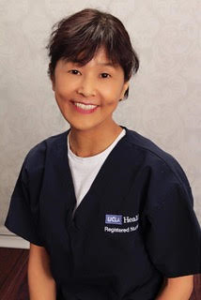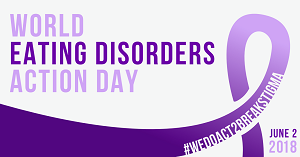As a health professional, I felt ashamed and thought I was not sick enough to have an eating disorder
As a health professional, I felt ashamed and thought I was not sick enough to have an eating disorder

By Masae Yasuda (Japan)
“Every day, mature-age people around the world suffer silently with an eating disorder – like Masae, who shares her story here, these people may be working in the very health profession established to treat this illness. Stigma and myths are a big problem. Much research focus is on young people. Of course we need research there. But we also need more research on middle-aged and senior people in our communities. And we need more stories to let adults know they are not alone and it is okay to ask for help. This illness does not stop when adolescence stops.”
– June Alexander
I was the youngest of three children, raised in Tokyo, Japan. I was a typical good girl. I was close to my mom but I was exposed to verbal abuse by my aunt. My dad was distant.
I developed my first eating disorder at age 22 about 30 years ago while working as a registered nurse (RN) in an acute locked female psych unit, including taking care of eating disorder patients, in Japan. After a while, I felt burned out and felt depressed. Food restriction developed as a way to distract myself. I did not feel fat. I felt desperate and at some deep level thought if I lost a lot of weight, somebody would notice, and hopefully help me to escape the overwhelming work situation.
I shared my struggle with the chief nursing officer (CNO) at the hospital but he initiated a sexual relationship with me instead of helping me professionally. I felt dirty, weak, powerless and hopeless. I learned that even though I was a psych nurse, and working in the eating disorder treatment environment, I could not do anything to help myself heal from the illness. I felt unimportant. Furthermore, my self-dislike intensified because this was the second time I had been subjected to an unwanted sexual relationship. A chaplain had taken advantage of me when I was in high school. I also went to see a psychiatrist in Japan, but this was a typical three-minute appointment. Making the appointment and keeping it had taken much courage but afterwards I felt distraught and desperate. There was no hope or help for me.
At age 27, I came to the USA to attend a graduate school for nursing. My behaviors got worse because of the new environment, new culture, language barrier, stress, and loneliness. Gradually, over the next five years, I developed a few healthier ways of coping and managing each day.
As an international student, I did not know what resources were available on campus. Even though I was engaging in eating disorder behaviors, I was able to survive and complete my course work. At age 32, I felt free from my eating disorder when I completed my Master’s program. I did not know how I got better, but for now I felt better. I had more friends by this time. I felt more comfortable in English and American culture. I felt more confident and free. I was much happier. I was symptom-free for about the next 13 years.
The second episode with my eating disorder began in my late 40s. By age 49, I had been living in Los Angeles for 13 years. I was married, I was working at an adolescent eating disorder unit as a RN full time, I was raising two boys, but I was used to Japanese ways of doing things, not American. The way of parenting was culturally different, being pregnant, giving a birth, raising kids, everything was new to me. At this same time I started working with Japanese professionals to introduce to Japan some of the American ideas for eating disorder treatment.
I found out that my husband was not a good match but I persevered because I wanted to believe my marriage was perfect. I was trying to make myself believe I was happy, when deep inside I was not.
So, my relapse developed. Even though I had coped for many years, I could not bring myself to disclose my eating disorder history to another health professional. I was scared of criticisms from other people. I felt shameful about the fact I had an eating disorder in the past.
Initially, my symptoms were not outwardly evident. I went to see a therapist just wanting to process my past. Once I started talking about my childhood, my mind suddenly started telling me to restrict, obsessively so. I became preoccupied with weight, food, and exercise. I could not even identify any of my feelings. I was overwhelmed, feeling something inside of me, but not knowing what it was.
My behaviors worsened markedly over time. At age 49, I started a residential program after multiple encouragements and warnings from my therapists that I was in need of care. I was still in denial. It was very scary to be admitted to the treatment center where I knew people professionally. “What would they think of me?” That was the biggest and the scariest question in my mind. (Later, I found out they all cared deeply about me my health, and my worry that they would think I was incompetent was needless).
Three years have passed, and in this time I attended a variety of programs here in the States. I thought my recovery would not take this long and I would get better much quicker because this was the second time and I thought I knew everything about the ways of the eating disorder. By that time, besides working in the treatment environment, I had translated and published the books “Life without ED” by Jenni Schaefer in Japanese and “8 keys to recovery from an eating disorder” by Carolyn Costin in Japanese.
During my treatment, I cringed when people expressed confusion about my disorder saying things like: “You are a RN who worked in the eating disorder field!” “You have translated two books about eating disorders!”, “Didn’t you know you had an eating disorder?” or worse ”Didn’t you know better?”
Yes, I had worked as an eating disorder nurse and had these other achievements, but the illness was a totally different story in my mind. I asked people to avoid saying that I should have known better, because I did not know.
Maybe this is only me, but feeling ashamed and feeling like a failure, was the hardest thing for me while seeking and undergoing treatment. With every triggering comment I felt very negative about myself, thinking “I was not smart enough! I was not good enough! I know even before you say anything!”
Furthermore, I kept thinking I should be able to manage this myself, saying “I am not sick enough!” “I know much sicker people!” “Everything will return to normal as soon as I stop my behaviors!” “I am too old to have an eating disorder!” and then acknowledgement of the truth: “I cannot stop!” “I don’t know how”. I feel ashamed even disclosing these thoughts here because in my mind I continue to think I should have known better.
Today, however, I am really working on recovery. I separated from my husband and started living on my own. I believe my eating disorder re-developed as a way (not a healthy way) of coping with my unhappiness in marriage and with my life.
For people who are struggling silently now, I encourage you to give yourself permission to take a break and to get support from others even though you might feel to do so is impossible or unnecessary. I was told I would never be ready to get better if I waited. I was thinking I was fine, I was not sick enough, I would be OK, but now, looking back, I know they were distorted thoughts that were not true.
This is my recovery story from an eating disorder. I recovered once when young and relapsed in middle age, while working in the field as a RN. All the knowledge I had about eating disorders did not help me to stop the eating disorder behaviors at all. Rather, having some awareness made me more skeptical to the comments of the professionals because I thought I was not sick enough compared with other clients in my care.
Even though I know about a lot about eating disorders professionally, to recover and heal from the illness I needed to experience all the stages and the different emotions on my own. I could not bypass anything. I needed to use and listen to my own heart as well as my head, and allow my mind and body to heal and be one. I felt frustrated with myself because I recognized that some thoughts and behaviors were distorted or disordered, but while in the clutches of the illness, these dominated my real thoughts and feelings. I could not change them on my own.
I know in my head it is wise for a health professional in the field to seek help as soon as possible if they become aware of eating disorder signs or symptoms developing, but in my heart I know it is not that easy. Maybe the only thing I can say is there are other professionals also receiving treatment and it is okay. It will be okay for you, too. Reach out today.
About Masae
Masae is a registered nurse in Japan and the United States. She has worked in the psychiatric settings including with eating disorder patients in both countries. She founded 摂食障害(Eating Disorder Hope Japan) in 2014 to improve treatment for people with an eating disorder. She translated two ED related books and continues working on two more books. When she goes back to Japan every summer, she visits different hospitals, nursing colleges, family/clients support group to share her professional and personal American experience to Japanese professionals, clients and families. She has organized two study tours for Japanese professionals to learn and visit various treatment facilities in Los Angeles. Her goal is to build the first eating disorder specialized program/unit/center in Japan by 2020. Towards this end, Masae is gathering recovery stories to encourage particularly Japanese people. To participate, go to https://jp.surveymonkey.com/r/ST83GVR
Contact: www.edrecoveryjapan.com (Japanese)
email: info@edrecoveryjapan.com
FB:EatingDisorderLosAngeles (Japanese)
Twitter: @edhopejapan (Japanese)
 Take part in World Eating Disorders Action Day
Take part in World Eating Disorders Action Day
World Eating Disorders Action Day on June 2, 2018 is a grassroots movement designed for and by people affected by an eating disorder, their families, and the medical and health professionals who support them. Uniting activists across the globe, the aim is to expand global awareness of eating disorders as genetically linked, treatable illnesses that can affect anyone. The Third Annual #WorldEatingDisordersDay will take place on June 2, 2018 with a focus on breaking stigma about Eating Disorders. #WeDoAct2BreakStigma.
Join the virtual campaign on social media and host a local event to share information and advocate for policy change to ensure access to evidence based treatment for all affected.





